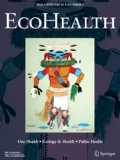Abstract
The Global Mercury Project (GMP) is an initiative of the United Nations in collaboration with numerous government and nongovernment organizations to promote knowledge and capacity building on the links between small-scale gold mining practices and health, ecosystem, and social factors, and to implement interventions that reduce mercury pollution and exposure caused by mining activities in developing countries. Knowledge regarding the use of mercury and the dynamics of complex environmental, health, socioeconomic, and cultural conditions in and surrounding small-scale mining sites is particularly needed for the purpose of developing appropriate community-based measures to reduce mercury-related problems. GMP strategies aim to build upon local knowledge and practices to train miners on the use of cleaner and affordable technologies of mining and mineral processing in order to minimize negative impacts. The initiative is especially proactive in facilitating transdisciplinary and participatory models of community interaction, involving local, regional, and international stakeholders in each of the strategy design, community assessment, and community intervention phases. The six participating countries are Brazil, Indonesia, Lao People’s Democratic Republic, Sudan, Tanzania, and Zimbabwe. This article outlines GMP’s objectives and scope of activities and also highlights achievements, challenges, and opportunities for future development.

Similar content being viewed by others
References
Babut M, Sekyi R, Rambaud A, Potin-Gautier M, Tellier S, Bannerman W, et al. (2003) Improving the environmental management of small-scale gold mining in Ghana: a case study of Dumasi. Journal of Cleaner Production 11:215–221
Dakubo C (2004) Ecosystem approach to community health planning Ghana. EcoHealth 1:50–59
Forget G, Lebel J (2001) An ecosystem approach to human health. International Journal of Occupational and Environmental Health 7(2 Suppl):S3–S36
GMP Sociological Reports (2004) Available: http://www.unites. uqam.ca/gmf/intranet/gmp/documents/documents.htm
Hilson G (2002a) Small-scale mining in Africa: tackling pressing environmental problems with improved strategy. Journal of Environment and Development 11:149–174
Hilson G (2002b) The environmental impact of small-scale gold mining in Ghana: identifying problems and possible solutions. The Geographical Journal 168:57–75
Hilson G (2005) Strengthening artisanal mining research and policy through baseline census activities. Natural Resources Forum 29:144–153
Hinton JJ, Veiga MM, Beinhoff C (2003a) Women, mercury and artisanal gold mining: risk communication and mitigation. Phys. IV France 107(617):10.1051
Hinton JJ, Veiga MM, Veiga ATC (2003b) Clean artisanal gold mining: a utopian approach? Journal of Cleaner Production 11:99–115
Ikinguara JR, Akagi H (1996) Monitoring of fish and human exposures to mercury due to gold mining in the Lake Victoria goldfields, Tanzania. Science of the Total Environment 191:59–68
International Labour Organization (ILO) (1999) Social and Labour Issues in Small-scale Mines. Report for discussion at the Tripartite Meeting on Social and Labour Issues in Small-scale Mines, ILO, Geneva
Lebel J (2003) Health: An Ecosystem Approach, Ottawa, Canada: International Development Research Centre
Lebel J, Forget G (2001) An ecosystem approach to human health. International Journal of Occupational and Environmental Health 7:S3–S36
Mergler D (2003) Integrating human health into an ecosystem approach to mining. In: Rapport DJ, Lasley WL, Rolston DE, Nielsen NO, Qualset CO, Damania AB (eds), Managing for Healthy Ecosystems Boca Raton, FL: Lewis Publishers, pp 875–883
Mergler D, 2002. Review of neurobehavioral deficits and river fish consumption from the Tapajós (Brazil) and St. Lawrence (Canada). Environmental Toxicology and Pharmacology 12:93–99
Mol JH, Ouboter PE (2004) Downstream effects of erosion from small-scale gold mining on the instream habitat and fish community of a small neotropical rainforest stream. Conservation Biology 18:201–214
Rapport DJ, Mergler D (2004) Expanding the practice of ecosystem health. EcoHealth 1(Suppl 2):4–7
Sasapu B, Crispin G (2001) Country Study Report on Small-scale Mining in Papua New Guinea, Country study commissioned by MMSD, 30 p. Available: http://www.222.iied.org/mmsd/
Veiga MM, Baker R (2004) Protocols for Environmental and Health Assessment of Mercury Released by Artisanal and Small Scale Miners, Report to the Global Mercury Project: removal of barriers to introduction of cleaner artisanal gold mining and extraction technologies, GEF/UNDP/UNIDO, 170 p. Available: http://www.globalmercury.org
Webb J, Mainville N, Mergler D, Lucotte M, Betancourt O, Davidson R, et al. (2004) Mercury in fish-eating communities of the Andean Amazon, Napo River Valley, Ecuador. EcoHealth 1(Suppl 2):59–71
World Health Organization (WHO) (1990) International Programme on Chemical Safety. Environmental Health Criteria 101: Methylmercury, Geneva: World Health Organization
Acknowledgments
This project is possible due to the technical and financial support from the Global Environmental Facility, the United Nations Development Programme, and the United Nations Industrial Development Organization. Our appreciation also goes out to all members of the Project Coordination Unit for their leadership and all the team members, collaborating partners, workshop participants, and community members, whose dedication and innovation led to the remarkable achievements of the GMP within 3 years of its launching. We are particularly grateful to the Assistant Country Focal Points: Roberto Villas-Boas (Brazil); Budi Susilorini (Indonesia); Eravanh Boungnaphalom (Lao PDR); Mohamed Suliman Ibrahim (Sudan); Aloyce Tesha (Tanzania); and Dennis Shoko (Zimbabwe).
Author information
Authors and Affiliations
Corresponding author
Rights and permissions
About this article
Cite this article
Spiegel, S.J., Veiga, M.M. Building Capacity in Small-Scale Mining Communities: Health, Ecosystem Sustainability, and the Global Mercury Project. EcoHealth 2, 361–369 (2005). https://doi.org/10.1007/s10393-005-8389-9
Published:
Issue Date:
DOI: https://doi.org/10.1007/s10393-005-8389-9




